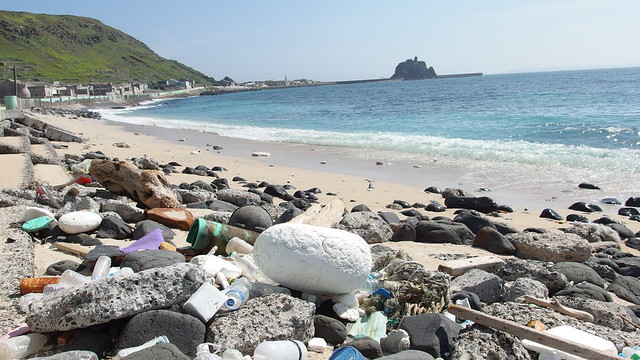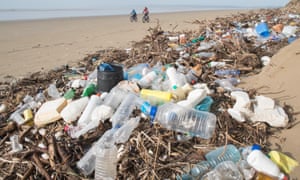http://e-info.org.tw/node/115668
可分解塑膠比較環保嗎? 聯合國:進入海洋仍難消化
文字大小
539 2 Share1
本報2016年5月30日綜合外電報導,姜唯編譯;蔡麗伶審校
標榜生物可分解的塑膠袋,真的比較環保嗎?聯合國環境科學家警告,這種塑膠在海中難以快速分解,並無法真正解決海洋垃圾問題。
澎湖東嶼坪北面海岸上的垃圾。圖片來源:本報資料照。
可分解塑膠是解藥? 聯合國專家:沒那麼簡單
號稱比較環保的可分解塑膠,曾被認為是永續的替代方案,因為就算進入海洋亦可分解。不過,聯合國環境規劃署首席科學家麥克格雷德(Jacqueline McGlade)表示,事情沒有那麼簡單。
「許多標榜可分解的塑膠,像是購物袋,只會在50°C的環境下分解,而海洋並沒有這麼高溫。這些塑膠垃圾沒有浮力會下沉,也不會因為曝曬到紫外線而分解。」麥克格雷德說。
聯合國認為,海洋垃圾問題的最佳解是改善垃圾收集和回收的流程,尤其是在開發中國家。不過,麥克格雷德指出,部分可生物分解塑膠的添加物使之難以回收,而且在自然環境中可能有害。
塑膠垃圾無處不在 生態、經濟皆受害
而本週全球170國齊聚奈洛比參加聯合國環境大會,預計將討論出因應塑膠微粒問題的解決方案。在會議上,麥克格雷德指出:「我們在查戈斯群島(位於印度洋)都發現塑膠垃圾。對塑膠垃圾而言,距離不是問題。」
根據聯合國的報告,2014年有超過3億噸塑膠產品被製造出來,以目前的趨勢,2050年塑膠產品量將暴增到20億噸,而進入海洋的塑膠垃圾量則不得而知。聯合國認為,海洋中塑膠垃圾無處不在。
海洋塑膠垃圾包羅萬象,包括可能纏住海豚的漁具和小於5mm的塑膠微粒,產生嚴重的生態、社會和經濟成本。
像水母就會以塑膠垃圾為家,或是隨之漂流,擴張生活範圍。專家認為水母生活範圍擴張不是好現象,因為牠們會吃掉大量的浮游生物,和魚類及其他海洋生物競爭。
聯合國報告寫到,海洋垃圾問題過去十年間才終於受到重視。「1970年代就有研究提出這個問題,但是當時未能引起科學界的迴響。」
Biodegradable plastic 'false solution' for ocean waste problem
UN’s top environmental scientist warns bottles and bags do not break down easily and sink, as report highlights the ubiquity of plastic debris in oceans
Biodegradable plastic water bottles and shopping bags are a false solution to the ubiquitous problem of litter in the oceans, the UN’s top environmental scientist has warned.
Most plastic is extremely durable, leading to large plastic debris and “microplastics” to spread via currents to oceans from the Arctic to the Antarctic, aUN report published on Monday found.
Greener plastics that breakdown in the environment have been marketed as a sustainable alternative that could reduce the vast amount of plastic waste that ends up in the sea after being dumped. But Jacqueline McGlade, chief scientist at the UN Environment Programme, told the Guardian that these biodegradable plastics were not a simple solution.
“It’s well-intentioned but wrong. A lot of plastics labelled biodegradable, like shopping bags, will only break down in temperatures of 50C and that is not the ocean. They are also not buoyant, so they’re going to sink, so they’re not going to be exposed to UV and break down,” she said.
Speaking at the the UN environment assembly in Nairobi, where 170 countries are meeting and expected to pass a resolution on microplastics later this week, she added: “We have detected plastics in places as far away as the Chagos Islands [in the Indian Ocean]. Even if you are remote, you are not safe from it.”
More than 300m tonnes of plastic were produced in 2014 and that is expected to swell to nearly 2,000m tonnes by 2050 on current trends, the UN report said. While the exact amount that reaches the oceans is not known, the report concluded: “plastic debris, or litter, in the ocean is now ubiquitous.”
The spread of everything from large plastic debris such as fishing gear which dolphins can become entangled with, to fragments smaller than 5mm in diameter known as microplastics, has ecological, social and economics costs.
Jellyfish, for example, are using plastic as a habitat and to hitch a ride, allowing them to extend their range. The spread of jellyfish is considered bad news by experts because of the amount of plankton they eat, taking away food from fish and other marine life.
“There is a moral argument that we should not allow the ocean to become further polluted with plastic waste, and that marine littering should be considered a ‘common concern of humankind’,” the report’s authors wrote.
The main solution to plastics in the ocean is better waste collection and recycling, particularly in the developing world, the UN said. But McGlade said that some of the biodegradable additives in plastic to allow it to break down made it harder to recycle, and potentially harmful in the natural environment.
“When you start adding all of that [additives], when it becomes waste, they [the additives] become the enemy of the environment. As consumers we need to think of the use of plastic,” she said.
The UN report said that it was only in the past decade that plastics in the ocean had been taken seriously. “Warnings of what was happening were reported in the scientific literature in the early 1970s, with little reaction from much of the scientific community.”
- The Guardian’s travel and accommodation was paid for by the UN.



沒有留言:
張貼留言